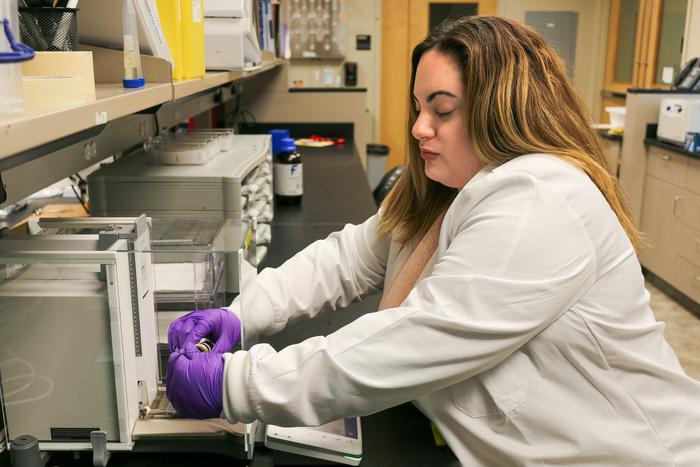For most patients, acute pain following a surgical procedure is a common and expected hurdle which is eventually cleared during recovery. However, there is a small but significant patient population that experiences chronic post-surgical pain that may linger for six months or longer.

Credit: TTUHSC
For most patients, acute pain following a surgical procedure is a common and expected hurdle which is eventually cleared during recovery. However, there is a small but significant patient population that experiences chronic post-surgical pain that may linger for six months or longer.
Sex hormones (e.g., estrogen in females and testosterone in males) are generally regarded as contributors to post-surgical pain development and maintenance, and basal sex hormones are the range of sex hormones expected to be produced in a healthy individual at any point in time. When basal sex hormone levels have been pathologically altered and fall outside the range considered to be clinically normal, they are referred to as basal sex hormone alterations, and very little is known about the role basal sex hormone alterations play in the pain process, including acute and chronic pain
To help investigate the influence basal sex hormone alterations may have on chronic post-op pain, the National Institutes of Health (NIH) recently awarded a five-year, $1.94 million grant (“Examination of sex hormone alteration on post-operative pain development and treatment”) to Jenny Wilkerson, Ph.D., from the Department of Pharmaceutical Sciences at the Texas Tech University Health Sciences Center Jerry H. Hodge School of Pharmacy.
With the grant, Wilkerson will seek to develop novel altered sex hormone models that mirror the surgical patient population and investigate any antinociceptive profiles that may influence these models. Antinociception is a process by which sensory neurons prevent the detection of painful stimuli.
It has been well established that sex hormones are important for pain processing, and that pain levels can increase or decrease according to the absence or presence of various sex hormones. Wilkerson said much of the preclinical research related to pain and sex hormones is performed following the removal of the sex organs (testes in males, ovaries in females) in different animal models.
“Because we are able to observe the pain response after the sex organ removal, we know that removing the sex organs, or removing the ability to produce those sex hormones, can indeed impact pain processing,” Wilkerson said. “You basically get increased sensitivity to many different pain stimuli and many different types of pain.”
That knowledge of pain gained through animal models is considered the gold standard in preclinically determining the influence of sex hormones on pain. However, Wilkerson said that does not mirror what is seen in most human patients, the majority of whom have not experienced a complete removal of the sex organs, unless they are a female who has undergone a hysterectomy. She said women who have undergone a cesarean section, women living with polycystic ovary syndrome and men who have been diagnosed with low testosterone are examples of patients living with basally altered sex hormone levels.
“A patient with one of these conditions might need a surgical procedure, but we don’t know to what degree their altered sex hormone levels will impact their recovery,” Wilkerson said. “We don’t really have a very good understanding of how basally altered sex hormone levels actually impact a person’s post-surgical pain recovery and response after that surgery has taken place. Hopefully, my research will be able to develop better models to address that impact for patients who have basally altered sex hormone levels, but have not undergone sex organ removal.”
If she is able to develop those models, Wilkerson said her work will help inform the scientific community about important considerations that may be essential for those patient populations.
“Should patients with basally altered sex hormone expect to need longer recovery times from post-surgical pain, and are they going to need more drugs or fewer drugs to treat that pain?” Wilkerson asked as an example. “Are all of their other drugs still going to be as effective post-surgery — as you would expect to see in a patient that does not have those basically altered sex hormone levels — and what does that mean down the road for their long-term overall health? Those are questions we hope to answer.”
Wilkerson said the research funded by this latest grant also will attempt to determine whether the immune system is altered due to these basal sex hormone differences, and whether or not that may contribute to any type of altered pain behavior observed post-surgery. She’s also interested in looking at long-term genomic and genetic changes that may potentially occur due to these altered sex hormone levels.
“I’m also going to be looking at whether there’s increased transition from acute, post-surgical pain to a chronic, enduring pathological pain state due to these altered sex hormone levels,” Wilkerson added. “That’s another big question that I hope to answer with this project.”
###




